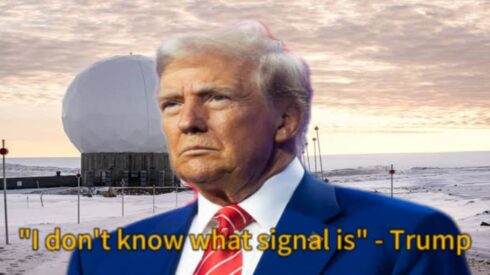Donald Trump has once again ignited controversy by suggesting that military force could be an option in Greenland, a strategically significant Arctic territory under Danish control. While he did not explicitly advocate for an invasion, his reluctance to dismiss military action outright has raised concerns among international leaders. His remarks came during a recent interview when he was pressed about his past interest in acquiring Greenland, a topic that previously strained U.S.-Denmark relations.
Trump has long viewed Greenland as a valuable asset due to its rich natural resources and strategic military positioning. The Arctic region has become a hotspot for global superpowers, with China and Russia increasing their influence. His renewed discussion on the matter has fueled speculation about U.S. intentions, particularly as climate change accelerates Arctic accessibility, making Greenland even more significant for trade, security, and resource extraction.
Donald Trump Faces Backlash from Denmark and Greenland Leaders
Donald Trump’s remarks quickly drew responses from both the Danish and Greenlandic governments, reaffirming that Greenland is not for sale and dismissing any possibility of military intervention. Danish Prime Minister Mette Frederiksen reiterated Denmark’s commitment to Greenland’s autonomy while emphasizing the importance of Arctic stability. Greenlandic leaders also expressed concerns, stating that his rhetoric disregards their sovereignty and the will of the local population.
Trump first floated the idea of purchasing Greenland in 2019 when his administration proposed acquiring the island as a strategic asset. The suggestion was met with widespread ridicule and diplomatic friction, leading him to cancel a scheduled state visit to Denmark. With his latest comments, experts worry that his stance could disrupt Nordic relations and further strain U.S. alliances in Europe.
Donald Trump Admits He Does Not Know What Signal App Is
Donald Trump revealed in a recent interview that he is unfamiliar with Signal, a popular encrypted messaging application widely used by journalists, activists, and government officials for secure communication. When asked about its significance in modern digital security, he appeared confused, downplaying its importance and shifting focus to his own social media platform, Truth Social.
Trump’s lack of awareness of Signal raises questions about his understanding of digital security in an era where encryption and privacy concerns dominate the global landscape. Signal has been recommended by cybersecurity experts and is widely used by intelligence communities. His unfamiliarity with such a crucial communication tool adds to concerns about his grasp of modern technology, especially given his past controversies involving digital security.
Trump’s Digital Literacy Questioned by Cybersecurity Experts
Donald Trump’s admission that he does not know about Signal has sparked criticism from cybersecurity experts, who argue that a leader’s understanding of digital tools is crucial in today’s world. In an era where cyber threats, misinformation, and encrypted messaging play significant roles in national security, they contend that a lack of familiarity with secure communication platforms could impact decision-making on key cybersecurity policies.
Trump’s reliance on more conventional or publicly scrutinized communication methods raises potential security risks, experts say. Former intelligence officials have highlighted the importance of encrypted messaging platforms like Signal in protecting national security interests. His unfamiliarity with these technologies reinforces ongoing debates about whether political leaders should be better informed about advancements in digital security.
Trump’s Greenland Remarks and Digital Blind Spots Could Have Political Consequences
Donald Trump’s comments on Greenland and his lack of knowledge about Signal have added to the ongoing scrutiny of his leadership approach. His Greenland remarks may resonate with nationalist supporters who favor U.S. expansionist rhetoric, but they risk alienating moderate voices concerned about international stability. Additionally, his unfamiliarity with modern digital tools could reinforce criticisms regarding his grasp of cybersecurity and technological advancements.
Trump’s rhetoric has often been a lightning rod for controversy, and his latest statements are no exception. Political analysts suggest that his approach to Greenland reflects a broader strategy of challenging global norms while prioritizing American interests. However, his gaps in technological knowledge could provide ammunition for critics who argue that he is out of touch with the evolving digital landscape. Whether these recent controversies will significantly impact his political influence remains to be seen, but they highlight the intersection of technology, geopolitics, and leadership.
Global Reactions and Potential Consequences for U.S. Foreign Policy
Donald Trump’s Greenland remarks have already spurred reactions from global leaders, with NATO allies emphasizing the importance of Arctic cooperation rather than confrontation. The Biden administration has also distanced itself from his statements, reinforcing its commitment to diplomacy in the region.If he were to regain office, his stance on Greenland and other international issues could shape future U.S. foreign policy in unpredictable ways.
Trump’s approach to digital security will also be closely scrutinized as world leaders increasingly rely on encrypted communication. Whether these issues will significantly impact his political standing or remain passing controversies is uncertain, but they highlight the ongoing intersection of technology, geopolitics, and leadership in today’s world.














